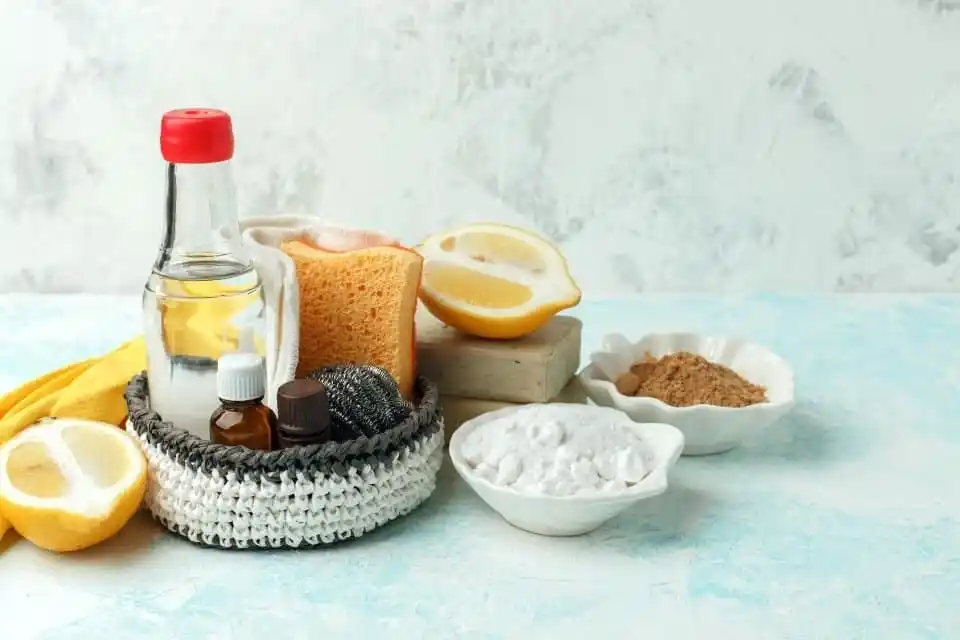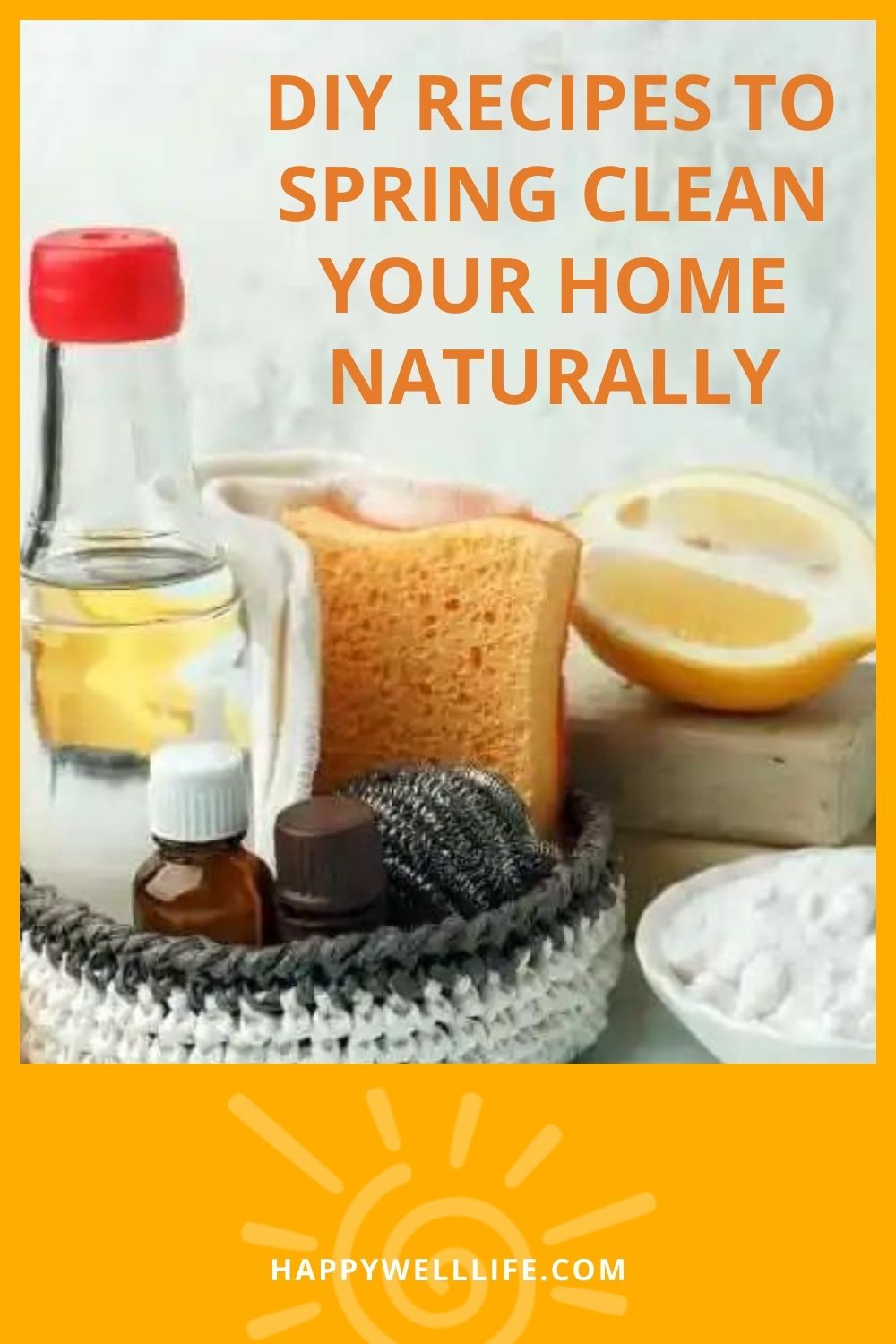Spring Clean Your Home Naturally

Spring is finally here! And this time of year always makes me want to jump into spring cleaning as I get ready for summer, how about you? However, as I’ve written about before, conventional cleaning products can be full of toxins. So how do you spring clean your home naturally?
While there are safer cleaning products on the market these days, I still prefer to DIY my cleaning products from scratch. That way I know exactly what is going into them. I know I won’t be breathing in anything toxic, getting any harmful chemicals on my skin, or harming my cats.
Using essential oils makes for great cleaning products. Many essential oils are natural disinfectants, as they have antimicrobial, anti-fungal, or antiviral properties by nature. Yet even though essential oils are natural, they can still be very volatile. So it’s important to know about essential oil safety. And it’s always a good idea to wear gloves, even when you spring clean your home naturally.
Ingredients to spring clean your home naturally
- White Vinegar — is about 5 percent acetic acid. Acetic acid kills bacteria and viruses in about 10 minutes, by chemically changing the proteins and fats that make up these bugs and destroying their cell structures. White vinegar is effective in killing E.coli, salmonella, and even the flu virus.I found this information fascinating. According to Professor Peter Collignon, an infectious diseases physician at the Australian National University’s medical school, elbow grease is the trick to effective cleaning. “Disinfectants have a 99 percent kill rate in 10 minutes. That means if there were 1 million bacteria present, there would still be 10,000 left after cleaning with vinegar alone. But if you do some scrubbing first, you could reduce the number of bacteria to about 1,000. Then using vinegar to clean takes out a further 99 percent. So you would end up with only 10 bacteria. Much fewer than the 10,000 you’d have if you’d relied on vinegar alone.”
- Baking soda — has also been shown to be somewhat antimicrobial. And it is abrasive enough to remove stains, especially when used with a Scotch bright pad.
- Liquid castile soap — is made from olive oil and sodium hydroxide. It is a non-toxic soap that produces natural suds and can be used in many different cleaning recipes. I like Dr. Bronner’s pure castile liquid soap.
- Essential Oils — offer varying degrees of anti-microbial, antiviral, and/or anti-fungal properties. Essential oils are concentrated (distilled) versions of the naturally occurring phytochemicals that plants use to protect themselves from bugs and bacteria. So you can use any scent of essential oil you like in your DIY cleaning products. But keep in mind some will have more antibacterial, antiviral, or anti-fungal properties than others.
Benefits of essential oils for cleaning your home
My favorite essential oils to use for cleaning are lemon oil, rosemary oil, and thyme oil. All are super fresh and uplifting. Lemon oil is very energizing and antimicrobial. And in addition to its antimicrobial properties, rosemary oil also helps with memory and concentration. Who couldn’t use that, right? Interestingly, dried rosemary used to be hung in the rafters of old one-room schoolhouses to help the kids retain more of what they learned. And thyme has antifungal, anti-inflammatory, and antibacterial properties which also makes it great for bathroom and kitchen cleaners.
In one study, citronella, eucalyptus, geranium, lemongrass, orange, palmarosa, patchouli, and peppermint essential oils were found to be the most anti-microbial essential oils. Always read labels and be sure to use 100% pure essential oils. Many brands will dilute their essential oils with carrier oils and/or add synthetic fragrances. Besides being potentially toxic (from the fragrance), synthetic fragrances do not contain antimicrobial properties.
Sidebar, eucalyptus oil is very toxic to cats so I don’t use it on our boat. Citrus oils can be harmful to cats as well, and I’m very careful to use the lemon essential oil where I know the cats won’t be walking. Rosemary and lavender are two essential oils that are considered safe to use around cats. But essential oils should never be used directly on pets, especially on cats. And while clove oil is excellent for cleaning/killing mold (which seems to crop up on boats!), it is very toxic to cats as well. So again we’re very careful where we use clove oil on our boat.
One thing to note when making cleaning sprays using essential oils: essential oils can eat through the plastic spray bottles and/or damage the mechanics of cheap pump sprayers. So be sure to buy industrial-strength spray bottles (intended for volatile chemical use.)
DIY recipes to spring clean your home naturally
Kitchen & Bathroom Counter Spray
This is my go-to daily counter-spray, smells so good as you clean, and does a fantastic job!
1 cup distilled water
1 cup white vinegar
2oz rubbing alcohol or vodka
20 drops rosemary essential oil (if you don’t have cats, try using 10 drops of rosemary EO plus 10 drops of lemon essential oil as it’s also a good degreaser.)
16oz. industrial spray bottle
Fill the spray bottle with distilled water, vinegar, and alcohol. Then add the drops of EOs. Shake well, and shake before each use. NOTE: Do not use vinegar on marble counters or tiles, as it can erode the marble. You can use the same recipe and omit the vinegar for marble counters.
Bath & Shower Scrub
I LOVE making this cleaner…it makes me feel like a kid in science class! As you mix it up, it totally changes texture.
1 cup baking soda
2 TBSP Dr Bronner’s liquid Castile soap
30 drops of lemon essential oil
12oz plastic container with lid (I use an empty hummus or salsa container)
Put the baking soda in the container and add the liquid soap—this is the fun, science experiment part! Stir until well mixed. Add in the essential oil and continue stirring unit thoroughly mixed. To use, scoop out a spoonful, apply with a Scotch-bright pad, and scrub.
Mold & Mildew Spray
This spray will kill mold and mildew on contact. Be sure to wear rubber gloves, as this mixture while natural and toxin-free, is also a bit volatile.
1 cup white vinegar
1 cup distilled water
20 drops of clove oil
20 drops of tea tree oil
16oz. industrial spray bottle
Fill the spray bottle with distilled water, vinegar, and alcohol. Then add the drops of essential oils. Shake well, and shake before each use. Do not use it around cats.
Window & Mirror Cleaner
For super-shiny windows and mirrors try this recipe with cornstarch. Apparently, the cornstarch helps to break up the water molecules and prevent streaking. I always used newspapers to wash/wipe off my mirrors and windows. Newsprint is easy to come by, it’s absorbent, and something about the newsprint ink also helps keep mirrors from streaking.
½ cup white vinegar
½ cup rubbing alcohol
1 TBSP corn starch
10 drops grapefruit or lemon oil
8 oz. industrial spray bottle
Add the ingredients in order, shaking well to mix in the corn starch. Shake well before each use. This recipe doesn’t keep well with the cornstarch in it, so if you’re not using the whole batch up at one time, best to leave out the cornstarch and add some in each time you use it.
Hope these recipes help you to Spring Clean Your Home Naturally! It’s also a good idea to test a small area first so you don’t damage the surface you’re cleaning. Vinegar is an acid, so it might not be suitable for all surfaces, and baking soda can be too abrasive for some surfaces as well.
Please leave a comment to let us know your favorite DIY cleaning solutions?


I’m going to try these mixtures, store products are expensive and so strong. I always use gloves and wear a mask when cleaning my bathroom. When cleaning my shower floor (poly plastic). I first wet the floor, then shake baking soda over the floor, then lay towesl over the top of the baking soda. I then microwave water to hot and pour over the towels making sure I wet them completely, I let this sit for maybe 15 minutes, then I press down on the towels in a scrubing motion and rub the soda into the floor. I remove the towels, next I squirt some Dawn liquid soap onto the floor and scrub again. Never fails a white clean floor. I only do this process maybe every other month. Thanks for sharing these recipes I’m anxious to try them.